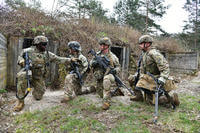It all began when then-President Bush learned of a likely gap in America's crucial electro-optical satellite coverage. Worried by this in his waning days, Bush pressed the then-Director of National Intelligence, Mike McConnell to come up with a solution.
A week after briefing Bush and Vice President Dick Cheney on the issue, McConnell issued a Jan. 21 memo, a week before his departure, ordering that the intelligence community buy two highly complex and very expensive satellites. He tried to get $3.5 billion for them inserted into the economic stimulus bill now making its way through the Senate to get the program started. The whole effort would have embraced the two exquisite capability satellites and two mid-tier 1.5 meter mirror satellites for a total cost of $10 billion. In generic terms, this whole effort is known in the government as BASIC (Broad Area Satellite Imagery Collection), although technically the program is currently moribund.
The decision to buy these satellites was pushed by Don Kerr, former director of the National Reconnaissance Office and then-principal deputy director of national intelligence. Kerr tried something similar just before leaving the NRO to join the DNI when the country's spy satellite makers and operators proposed a very high tech solution to plug the gap. To help the satellite money's chances of getting into the stimulus package, the DNI argued it would help create high-paying jobs. The Pentagon, which has rejected this approach of buying the best technology to plug the electro-optical gap in the past, performed an industrial base analysis of the proposed program found that would create roughly 1,200 jobs. A source with knowledge of the debate noted wryly that the $3.5 billion would have been among the most expensive job creation programs ever.
The OMB said no to the IC request to insert the money into the pending stimulus bill. But the saga has not ended. The new DNI, Dennis Blair, has ordered a top to bottom review of what the country needs in the way of electro-optical satellite capabilities. It should get under way this week. Meanwhile, the Pentagon is considering how and whether to fund the purchase of the two 1.5 meter EO satellites.
Blair's office is still deciding which greybeards will be tasked with the study. Regardless of who is picked, bear in mind that the country faces what could be a critical gap in one of our most sensitive capabilities and the government has spent two years inconclusively battling over just what path to take. The NRO suffered a very public slap in the face about a year ago when it was stripped of acquisition authority for BASIC, the first of at least three programs for which it lost milestone decision authority (MDA). The DNI reviews MDA for each major intelligence program each year. While the worrying gap edges closer, the DNI studies, Dodd plans and replans and the two sides continue to fail to get to a decision.
And there will be probably be a new NRO director soon. Word on the street is that Betty Sapp, currently deputy undersecretary of defense for intelligence, acquisition, resource and technology, or Al Munson, deputy director of national intelligence for future capabilities, have the best shot to replace Scott Large, the current director. Pete Rustan, the NRO's director of ground enterprises, is also in the running. How long it will take the new director to settle in and how long it will take the DNI to find their collective feet is an open question.
Meanwhile, GeoEye and DigitalGlobe believe they can deliver EO satellite capabilities for something like $750 million each. They argue that the government can buy data from them in return for government investment in their next generation of satellites. With the money saved, the government can buy more satellites, providing better revisit rates than would be the case under the NRO scenario of buying two exquisite and two mid-tier satellites. The debate will continue, but for how long.








